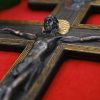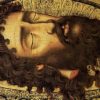Many people today probably think of Christianity as a collection of religious rules that tell us what to do and what not to do. The problem with a religion of law is that, while it points us in the direction of how we should behave, it does not give us the spiritual strength necessary to follow the rules. A faith that is simply a form of legalism leads inevitably to the frustration of never being able to fulfill its commandments. If that is what people think that Christianity is, then it is no surprise that many have no interest in it. A faith that results only in feelings of guilt without hope for the healing of the soul is pretty unappealing.
 In today’s gospel reading, Jesus Christ demonstrated that He did not come to give us a new set of laws to obey according to our own moral strength. He showed that He did not come merely to deliver us from the guilt of falling short of obeying divine commandments. Yes, He forgave the sins of the paralyzed man, thus showing His divinity in a way that scandalized religious leaders. But He also revealed that His salvation is not defined in legalistic terms, as though the whole point of the Christian life were to be declared innocent in a court of law for certain offenses. If that were the case, there would have been no point in healing the paralyzed man, for he could have been acquitted of his sins while remaining unable to move.
In today’s gospel reading, Jesus Christ demonstrated that He did not come to give us a new set of laws to obey according to our own moral strength. He showed that He did not come merely to deliver us from the guilt of falling short of obeying divine commandments. Yes, He forgave the sins of the paralyzed man, thus showing His divinity in a way that scandalized religious leaders. But He also revealed that His salvation is not defined in legalistic terms, as though the whole point of the Christian life were to be declared innocent in a court of law for certain offenses. If that were the case, there would have been no point in healing the paralyzed man, for he could have been acquitted of his sins while remaining unable to move.
The man’s paralysis is a vivid icon of the state of humanity cast out of Paradise, corrupted by our refusal to pursue the fulfillment of our calling to become like God in holiness. By disorienting ourselves from our true vocation and looking for fulfillment in gratifying our self-centered desires, we have diminished ourselves to the point of becoming as weak as the man unable to get up off the ground. Christ responded to him with healing mercy, granting the poor man strength and restoration beyond what he could ever have given himself, no matter how hard he tried. In response to the Savior’s gracious therapy, the man obeyed the command to stand up, pick up his bed, and walk home. Apart from this personal encounter with the Lord, the man would have remained enslaved to debilitating weakness, but the Savior’s healing restored his ability to move forward in a life suitable for a person who bears the image and likeness of God.
When we ask for the Lord’s mercy in services and prayers, we are asking for the same therapy that He extended to the paralyzed man. We ask Him to heal our wounds, restore our strength, and help us become participants in the eternal joy for which He created us. We ask Him to deliver us from the wretched, corrupt state of being so weak before our passions that we feel helpless before our familiar temptations, no matter how much we despise them. We ask Him to help us gain the wherewithal to put behind us the ingrained habits of thought, word, and deed that serve only to make us and our neighbors miserable. We even dare to ask Him to make us “partakers of the divine nature” who share by grace in His victory over death, which is the wages of sin.
To rise up, take up our beds, and walk home requires obedience to Christ’s commands, but not a legalistic obedience in the sense of following a code for its own sake. Instead, this obedience is like following the guidance of a physician or therapist who makes clear to us what we must do in order to regain health and function for our bodies. Christ embodies true humanity and has made us participants in His restoration and fulfillment of our vocation to become like God in holiness. His commandments are not arbitrary or superficial, but go to the heart and require our healing as whole persons. St. Paul described what that looks like in today’s epistle reading: “Let love be genuine; hate what is evil, hold fast to what is good; love one another with brotherly affection; outdo one another in showing honor. Never flag in zeal, be aglow with the Spirit, and serve the Lord. Rejoice in your hope, be patient in tribulation, be constant in prayer. Contribute to the needs of the saints, practice hospitality. Bless those who persecute you; bless and do not curse them.”
That kind of life requires the purity of heart that comes from finding healing from our addiction to gratifying our self-centered desires, whatever they may be. We will never find liberation from paralysis before our passions by judging ourselves and others according to superficial checklists of piety or morality. It is entirely possible to congratulate ourselves for outwardly obeying laws while remaining enslaved to pride, anger, lust, greed, vengeance, and other spiritual disorders that show we have not embraced the merciful healing of the Savior. He taught that Old Testament laws on murder, adultery, and vengeance go to the heart in ways that call us to become holy as God is holy. We will make progress toward that infinite goal not by viewing the Christian life as an exercise in justifying ourselves in our own minds by our good behavior, but instead by using whatever gains we receive in spiritual clarity to become more aware of our sins, of our ongoing paralysis before our passions, and of our constant need for the healing mercy of the Lord.
The spiritual disciplines of the Church are essential for offering our sick selves for the Great Physician’s therapy. We must pray, fast, give to the needy, forgive our enemies, confess our sins, and mindfully reject temptations that would distract us from entering into the eternal joy that the God-Man shares with us. Even as religious legalism cannot heal our souls, we must not think that the laws of nations or the traditions of cultures, however admirable they may be, have the ability to set anyone free from the paralyzing forces of sin and death. If we do not remain focused on acquiring the purity of heart necessary to see God, we will likely become susceptible to the temptation to mistake what corrupt humanity can achieve by its own power with the eternal blessedness in which Christ calls us to participate.
In order to rise up from our paralysis, pick up our beds, and walk home, we must unite ourselves to Christ in holiness, which is simply another way of saying that we must personally receive His healing. Like the paralyzed man, we must obey Him in order to move forward in the blessed life that He has shared with us. We do not do so merely by our own strength, but by the transforming power of His mercy, which we receive as we reorient ourselves to Him from the depths of our hearts. Unlike any form of legalism, this is a path of deep humility which reveals our ongoing need for the divine therapy. We catch a glimpse of such humility in the repose of the Desert Father Abba Sisoes:
When Abba Sisoes lay upon his deathbed, the disciples surrounding the Elder saw that his face shone like the sun. They asked the dying man what he saw. Abba Sisoes replied that he saw Saint Anthony, the prophets, and the apostles. His face increased in brightness, and he spoke with someone. The monks asked, “With whom are you speaking, Father?” He said that angels had come for his soul, and he was entreating them to give him a little more time for repentance. The monks said, “You have no need for repentance, Father.” Abba Sisoes said with great humility, “I do not think that I have even begun to repent.”
No matter where we are on the journey to the Kingdom, let us all embrace the Savior’s mercy for the healing of our souls with the humility of true repentance. There is no other way to know the joy of liberation from our paralysis.

















